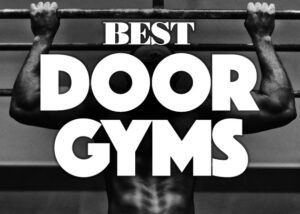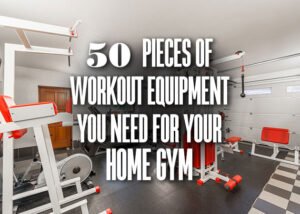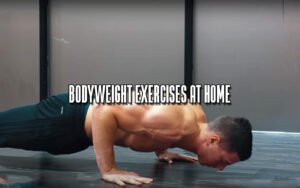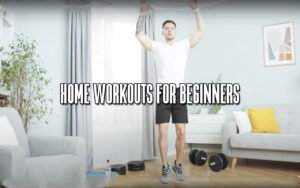
In recent years, the popularity of home workouts has surged, and for good reason. They offer convenience, flexibility, and cost savings compared to traditional gym memberships. However, paying attention to your nutrition tips is essential to maximize the benefits of your home workouts. What you eat is crucial in your energy levels, recovery, and overall fitness progress. This article will explore nutrition tips for losing weight and valuable diet tips to help you enhance your home workout results and achieve your fitness goals.
Prioritize Proper Pre-Workout Fuel
The food you consume before your home workout can significantly impact your performance. Aim for a balanced meal or refreshment that combines carbohydrates, protein, and healthy fats. Carbohydrates are your body’s primary energy source, so include whole grains, fruits, or vegetables in your pre-workout meal. Protein is essential for repairing and maintaining the body’s functions and growth of muscle tissue, playing a crucial role in the process, making it necessary for recovery and promoting development. Healthy fats, such as those in nuts or avocado, can provide sustained energy.
Pre-workout Snack Ideas
- Oatmeal topped with banana and a tablespoon of almond butter.
- Enjoy a delightful bowl of greek yogurt topped with fresh berries and a sweet drizzle of honey.
- A delicious combination of whole-grain toast topped with creamy avocado and a perfectly poached egg.
Nutrition Tips for Enhancing Your Home Workout Results
1. Stay Hydrated
Proper hydration is often overlooked but is vital for your workout performance. Even mild dehydration can lead to a drop in energy levels and hinder your ability to effectively push through your home workout. Strive to maintain a consistent daily water intake, ensuring increased fluid consumption before and during exercise.
If you have a more intense home workout planned or exercise in hot conditions, consider a sports drink that provides electrolytes to replenish what you lose through sweat. However, water should be sufficient for most workouts to keep you hydrated.
2. Timing is Key
Consuming food too close to your workout may result in discomfort. Exercising on an empty stomach can leave you feeling weak and exhausted. Achieving a perfect harmony balance tailored to your schedule and personal preferences is crucial.
A general guideline is to eat a full meal 2-3 hours before your home workout and a small snack 30 minutes to an hour before exercising. After your workout, eat a balanced meal or snack within two hours to aid recovery.
3. Post-Workout Nutrition for Recovery
After completing your home workout, your body needs nutrients to recover and repair. This is an essential time to focus on your nutrition. Protein is vital as it helps improve and build muscle tissue that may have been broken down during exercise.
Consider having a post-workout shake or snack that combines protein and carbohydrates for optimal recovery. Some options for eating tips include a whey protein shake with a banana, a turkey and avocado sandwich, or a quinoa bowl with grilled chicken and vegetables.
4. Don’t Forget About Micronutrients
While essential nutrients (carbohydrates, protein, and fats) are essential, don’t overlook essential nutrients like vitamins and minerals. These are crucial in various bodily functions, including energy production and immune system support.
Consider including colorful fruits and vegetables in your meals to provide a wide range of nutrients. Spinach and kale, for instance, are exceptional sources of vitamins A and C, while sweet potatoes boast an abundance of vitamin E and potassium.
5. Stay Mindful of Portions
Even when eating healthy foods, portion control is essential. Overeating can lead to excess calorie intake, which may hinder your fitness goals. Be mindful of your body’s hunger and fullness signals, and refrain from eating out of boredom or stress.
One helpful tip is to utilize smaller plates and utensils. This clever strategy can deceive your brain into perceiving that you are consuming a more significant portion than you are. Additionally, try to eat slowly and savor each bite, which can help you feel satisfied with smaller pieces.
6. Monitor Your Progress
Tracking your nutrition and fitness progress can provide valuable insights into what’s working and needs adjustment. Contemplate maintaining a food diary or utilizing a fitness application to enhance your dietary and fitness journey. These tools will facilitate recording your meals, workouts, and any alterations in your body composition.
By monitoring your progress, you can identify patterns and make informed decisions about your nutrition and workout routine. Additionally, witnessing the positive transformations in your fitness journey can be a powerful motivator to keep you going.
7. Listen to Your Body
Everyone is unique, and what works for one person may not work for another. Listening to your body and adjusting your nutrition and workout routine is essential. If you need more time to get the desired results, consult a registered nutritionist or fitness professional for customized guidance.
FAQs
Q1. Can I work out on an empty stomach if I’m doing a home workout?
While some people can tolerate working out on an empty stomach, having a light snack is generally advisable if you plan to exercise within an hour of waking up or if you haven’t eaten for several hours. Eating a small pre-workout meal or snack can give your body the energy to perform at its best during your home. It is also one of the best diet tips.
Q2. Should I consider taking supplements to enhance my home workout results?
Although supplements can be beneficial in certain situations, it is essential to remember that they should not be used as a replacement for a balanced and nourishing diet. If you have specific diet tips and tricks, restrictions or goals, such as building muscle or improving endurance, consider supplements like protein powder, creatine, or branched-chain amino acids. However, it’s always best to consult with a healthcare professional or registered nutritionist before adding accessories to your routine to ensure they are safe and appropriate for your needs.
Q3. Is it okay to indulge in occasional treats while following a nutrition plan for home workouts?
Absolutely! A nutrition ideas balanced approach to nutrition includes room for occasional treats or indulgences. Dietary limitations can be challenging to maintain long-term and may lead to Desires or binge eating. It’s lovely to enjoy your preference treats in moderation. It is essential to be conscious of portion sizes and make an effort to optimize them. Balance between indulging in pampering foods and nourishing your body with healthy choices. Remember that consistency and sustainability are vital in attaining your fitness goals.
Q4. What should I eat before a home workout, and how long before exercising should I consume it?
It’s essential to fuel your body before a home workout, but the timing and choice of foods can impact your performance. Ideally, aim to eat a balanced meal or snack 1 to 3 hours before your workout. This meal or snack should include a combination of carbohydrates, protein, and a small amount of healthy fats. Carbohydrates provide energy, while protein helps with muscle repair and growth. Examples include a banana with peanut butter, greek yogurt with berries, or a turkey and avocado sandwich on whole-grain bread. Experiment with different options to see what works best for your body and workout intensity.
Q5. Should I consume protein immediately after my home workout, and if so, what are some good sources of post-workout protein?
Yes, consuming protein after your home workout is essential to support muscle recovery and growth. The post-workout period, commonly referred to as the “anabolic window,” is when your muscles are more receptive to protein intake. Aim to have a protein-rich snack or meal within 30 minutes to 2 hours after your workout. Good sources of post-workout protein include lean meats like chicken or turkey, fish, eggs, dairy products, plant-based options like tofu and legumes, and protein shakes or smoothies. You can also pair protein with carbohydrates for a balanced post-workout meal, such as a turkey and vegetable wrap or a protein shake with a banana.
Q6. What are the best snacks to keep me energized during a long home workout or training session?
When you’re engaging in a longer home workout or training session, it’s essential to have energy-boosting snacks on hand to sustain your performance. Opt for snacks that provide a combination of carbohydrates and protein to maintain your energy levels and support your muscles. Some good options include trail mix with nuts and dried fruits, Greek yogurt with honey and granola, a peanut butter and banana sandwich, or whole-grain crackers with hummus. Hydration is also crucial during long workouts, so don’t forget to drink water or a sports drink with electrolytes to stay properly hydrated throughout your session.
Conclusion
Enhancing your home workout results goes beyond just exercise. It involves proper nutrition and fueling your body for success. You can optimize your fitness journey by prioritizing pre-workout fuel, staying hydrated, timing your meals, focusing on post-workout recovery, and being mindful of portions. It is important to remember that healthy eating tips and nutrition tips are crucial in promoting both your physical health and fitness. By making wise choices in the kitchen, you can speed up achieving your goals with enhanced efficiency and effectiveness. So, combine your dedication to home workouts with these nutrition tips, and you’ll be well on your way to achieving your fitness aspirations.








